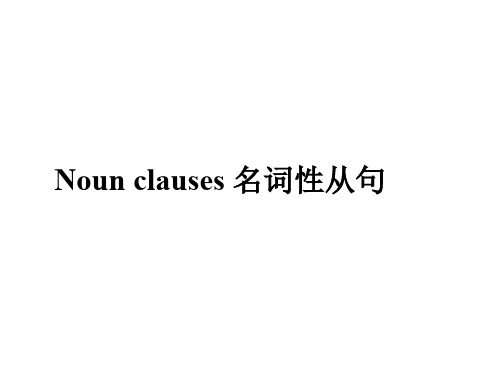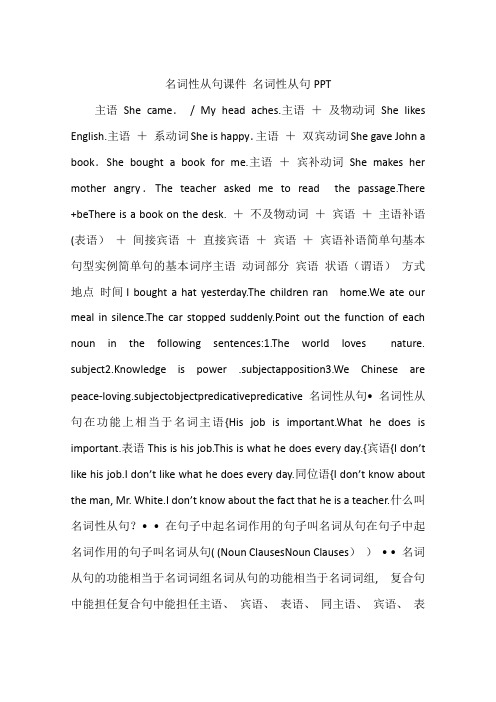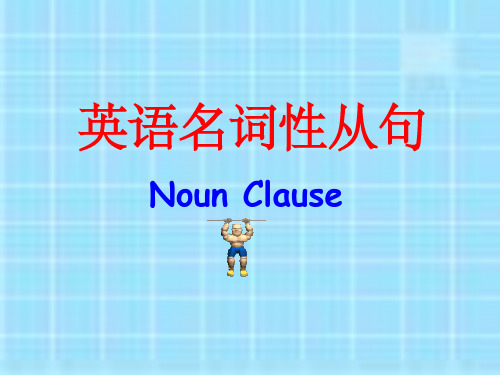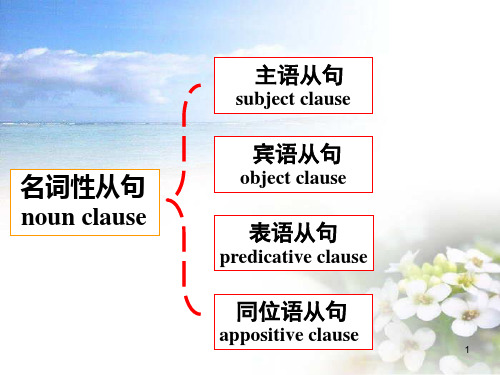【师说】高考英语总复习语法突破:专题12《名词性从句》ppt课件
高考英语语法完全讲解——名词性从句课件(共17张PPT)

三、what/whatever与
which/whichever的区别
what/whatever意为“什么/无论什么”,描述的事物在上下 文中没有范围;which/whichever意为“哪个/无论哪个”, 描述的事物在上下文中有范围。 To be honest, I can hardly understand what/whatever you have said. Here is the dress. This is what I have been dreaming of. Here are many beautiful dresses. You can choose whichever you like.
高考英语语法完全讲解 名词性从句
定义及分类
在句中起到名词所能充当的句子成分的从句称之 为名词性从句,名词常用来作主语、宾语、表语、 同位语,因此,对应的名词性从句可以分为四大 类:主语从句、宾语从句、表语从句、同位语从 句。
主句从句
1、作句子主语的从句叫作主语从句。 2、为避免句子头重脚轻,常用形式主语it代替主语从 句,把主语从句置于句尾。常用的句型有:It is/was+ 形容词/名词/过去分词+that从句。
表语从句
位于系动词之后作表语的从句叫表语从句。 The problem is who is to pay and when we can start.
同位语从句
同位语从句说明其前面名词的具体内容。通常由that引 导,常接同位语从句的名词有:news, conclusion, possibility, rumor, certainty, story, word, mystery, idea, doubt, hope, truth, question, belief, fact, message, evidence, information, explanation, rule, probability, question, wish, thought, statement, report, opinion, principle等。
高三英语复习课件:名词性从句(共22张PPT)

make...
改错: 1. I shall see to it what he is taken good care of
when you are abstehnatt.
2. I would appreciate if you can help me solve the difficult problem. it
补连接代词whatever, whoever,
whomever, whichever, whose.
缺状语 补连接副词whenever,wherever, why,how
只缺“是否”意思
补whether, if
什么都不缺 补that
3. 确定成分后,再根据句子意思选择引导词
分类
连接词
词义
充当的成分
从属连词
that if/whether as if/ as though
无 是否 似乎,好像
不充当成分 不充当成分 不充当成分
连接代词 连接副词
who(ever) whom(ever) whose(ever) which(ever)
what(ever) when(ever) where(ever) why how
(2)动词hate,like, dislike,appreciate,enjoy等表 示 “喜欢”, “厌恶”的动词以及一些动词短语 see to(负责,保证), depend on, rely on等常用 it作形式宾语,而将宾语从句后置。
改错:
1. If the delayed flight will take off depens much
5. We will take a trip to _w_h__at__ we call Tibet.
【师说】高考英语总复习语法突破:专题12《名词性从句》课件

What we should do next remains unknown.
我们下一步该干什么还不知道。 Whom we should serve is an important question. 我们应该为谁服务是个重要问题。
Where we shall do the test is still under discussion.
这事的真假是可疑的。
17
②当be that; 当be
sure用于肯定句时,后面的宾语从句的连接词常用 sure用于否定句时,后面的宾语从句的连接词常用
whether或if。
We are sure that he is innocent. 我们确信他是无辜的。
The old man didn't seem to be sure whether/if he had met me. 这位老人不太确定他是否见过我。
19
注意 ①一般情况下介词后只能用wh- 类连接词引导的宾语从
句。
I am surprised at what he said.
他讲的话使我吃惊。 ②介词后如果接that 从句,要先加上it, 再加that 从句,即 "介词+it+ that. " 结构。 You may depend on it that they will support you. 你放心,他们会支持你的。
14
(2)what引导的从句作主语,若表示单数概念,谓语动词一般 用单数形式;若表示复数概念,则谓语动词常用复数。
What he said is true. 他所说的是真的。
What he needs are books.
他所需要的是书。
名词性从句PPT课件

语态:被动语态和主动语态
被动语态
表示动作的接受者是主语,如 "The book was written by him."中的主语从句"The book was written"使用被动语态。
主动语态
表示动作的执行者是主语,如 "He wrote the book."中的主语 从句"He wrote the book"使用 主动语态。
抽象名词翻译
在汉译英时,有时需要将具体 名词抽象化,以使译文更加符
合英语表达习惯。
THANKS FOR WATCHING
感谢您的观看
04 名词性从句的特殊结构
it作形式主语
形式主语用于代替主 语从句,避免句子结 构不平衡。
It is important that we should learn English well.
It is+形容词/名词 +that+主语从句。
强调句型中的名词性从句
01
It
is/was+被强调部分
+that/who+句子其余部分。
表示现在的动作或状态,如"I know who he is."中的宾语 从句"who he is"使用现在时态。
过去时态
表示过去的动作或状态,如"He said that he was a student."中的宾语从句"he was a student"使用过去时态。
将来时态
表示将来的动作或状态,如"I will tell you what will happen."中的宾语从句"what will happen"使用将来时态。
名词性从句课件 名词性从句PPT

名词性从句课件名词性从句PPT主语She came./ My head aches.主语+及物动词She likes English.主语+系动词She is happy.主语+双宾动词She gave John a book.She bought a book for me.主语+宾补动词She makes her mother angry.The teacher asked me to read the passage.There +beThere is a book on the desk. +不及物动词+宾语+主语补语(表语)+间接宾语+直接宾语+宾语+宾语补语简单句基本句型实例简单句的基本词序主语动词部分宾语状语(谓语)方式地点时间I bought a hat yesterday.The children ran home.We ate our meal in silence.The car stopped suddenly.Point out the function of each noun in the following sentences:1.The world loves nature. subject2.Knowledge is power .subjectapposition3.We Chinese are peace-loving.subjectobjectpredicativepredicative名词性从句• 名词性从句在功能上相当于名词主语{His job is important.What he does is important.表语This is his job.This is what he does every day.{宾语{I don’t like his job.I don’t like what he does every day.同位语{I don’t know about the man, Mr. White.I don’t know about the fact that he is a teacher.什么叫名词性从句?• • 在句子中起名词作用的句子叫名词从句在句子中起名词作用的句子叫名词从句( (Noun ClausesNoun Clauses))• • 名词从句的功能相当于名词词组名词从句的功能相当于名词词组, 复合句中能担任复合句中能担任主语、宾语、表语、同主语、宾语、表语、同位语位语等等, 它在它在• • 因此根据它在句中不同的语法功能,名因此根据它在句中不同的语法功能,名词从句又可分别称为词从句又可分别称为主语从句、宾语从句、表语从句句、表语从句和和同位语从句同位语从句主语从句、宾语从名词性从句noun clause主语从句subject clause宾语从句object clause表语从句predicative clause同位语从句appositive clause主语从句在复合句中作主句的主语.引导词有连词that (that 不可省),whether; 代词有who, what ,which;副词when ,where, how, why 等.如: 1.That he is a famous singer is known to us.(It is known to us that he is a famous singer.)2.When he will go to America is not yet fixed.(It is not yet fixed when he will go to America.)We believe ( t h at ) h e is h on est .I t old h im ( t h at ) I w ou ld com e back soon .He said ( t h at ) h e w ou ld g o t h ere t h e n ext d ay an d t h at h is fam ily w ou ld n ’t g o t h ere.宾语从句在复合句中作主句的宾语.引导词有连词that (that 常可省略),whether,if; 代词有who, whose,what ,which;副词when ,where, how, why 等.如: 表语从句在复合句中作主句的表语.引导词有连词that (that 不可省),whether; 代词有who, what ,which;副词when ,where, how, why 等.如: Th e problem is t h at w e d id n ’t g et in t ou ch w it h h im .Th is is h ow Hen ry solved t h e problem . His su g g est ion is t h at w e ( sh ou ld ) fin ish t h e w ork at on ce.如果句子的主语是suggestion,advice.order等名词时,后面引导的表语从句用should+动词原形,should可省略.同位语从句在句中起同位语的作用.一般放在名词fact , news , idea , promise, thought , suggestion 等之后,用以说明或解释前面的名词.引导词有连词that ;少数情况下也可用连接副词等.如:1.The thought that we might succeed excited us.2.The idea that they should try a second time is worth considering.3.The suggestion that the plan (should) be delayed willbe discussed tomorrow. 名词suggestion,advice.order等词后的同位语从句的谓语动词要用should+动词原形,should可省略.What are noun clauses?His story is interesting.What he said is interesting.I heard his story.I heard what he said.I listen to his story.I listen to what he said.This is his story.This is what he said.The idea of going there is good.The idea that we go there is good.Subject clauseObject clauseObject clause aftera prepositionPredictive clauseAppositive clausePractice time:指出下列各名词性从句的种类1. At lunchtime, the radio weatherman reported that the mist would become a thick fog in the afternoon.2. She wondered if the buses would still be running.3. The truth is that the fog is too thick for the bus to run that far.4. She sensed that she was being watched by a tall man in a dark coat.5. When we will start is not clear.6. I had no idea that you were her friend.Object clauseObject clausePredicative clauseObject clauseSubject clauseAppositive clause名词性从句中的连接词有:连词:that / whether / as if(though);连接代词: what / who/ which / whose / whatever / whoever/ whomever / whichever,连接副词: where / when / why / how / wherever / whenever。
高考英语名词性从句讲解(最全版)44948PPT课件

4、I knew the news that our team won the match.
宾语从句
5、His suggestion is that we should finish the
work at once.
表语从句
精选PPT课件
7
“whether”---“是否”、不作成份、起连接作用
英语名词1
请思考 定语从句的定义:
起定语作用,用来修饰名词或代词的从句。
名词性从句定义
起名词性作用的从句,叫名词性从句。 换言之,在英语的句子结构中,本来该由名词充当的 主语、宾语、表语和同位语部分,换由一个句子来充 当,这样的句子就是名词性从句。
精选PPT课件
useful for us now(. 同位语从句)
精选PPT课件
8
If与whether的区别:
If 只能引导两种名词性从句:宾语从句、不放于句首 的主语从句。Whether四种从句均可以引导。
请思考:
1、Whether she will come back on time depends on
weather . 2、I asked him whether he could do me a favor .
精选PPT课件
10
请用if / whether填空:
1、I asked her _i_f_/_w__h_e_t_h_er she had a bike. 2._W__h__e_ther we will hold a party in the open air
tomorrow depends on the weather.
record .(同位语从句)
精选PPT课件
高考英语语法名词性从句讲解公开课课件

Would the buses still be running?
She wondered if/whether the buses would still be running.
16
(2) 疑问词引导的名词性从句也要求使用陈述句 语序,不能用一般疑问句(倒装)语序。
他是怎么成功的仍然是个谜。 How was he successful is still a puzzle. F( ) How he was successful is still a puzzle.T( ) 你能告诉我他住在什么地方吗? Could you tell me where he lives? ( T ) Could you tell me where does he live?F( )
连接代词: what / who/ which / whose / whatever / whoever / whomever / whichever,
连接副词: where / when / why / how / wherever / whenever。
11
• 连词: 引导从句,但在从句中不作成分 that :无词义,不作成分,起连接作用 whether/if:“是否”不作成分,起连接作用
连接副词
that whether/if
as if(though) What(ever) which(ever)
Who(ever)
/ 是否
好象 (无论)什么,
(无论)哪一个(些)
“(无论)谁(主格)”
/ /
/ 作主,宾,表,定 语 作主,宾,表,定 语
作主,宾
宾从中可省 If只用于宾从中有or not时不能用 / …….东西,……事 情 /
名词性从句优秀PPT课件

解析
A选项中“What”引导的是主语 从句,表示“他说的话不是真实 的”。B选项中“Who”引导的 是主语从句,表示“谁将去参加 会议还不知道”。C选项中 “Why”引导的是主语从句,表 示“他为什么离开学校还是一个 谜”。
THANKS
感谢观看
whom的用法
引导定语从句,相当于“whom”
引导名词性从句,相当于“who”
whose的用法
引导定语从句,表示“谁的”
引导名词性从句,表示“谁的”
which的用法
01
引导定语从句,相当于 “which”
02
引导名词性从句,相当于 “which”
03
名词性从句的时态与语序
时态的用法
一般现在时
A选项中“It is strange that…”是一个固定句型, 表示“奇怪的是…”,其中 that引导的从句是主语从句 。B选项中“It is a pity that…”也是一个固定句型 ,表示“遗憾的是…”,其 中that引导的从句是主语从 句。C选项中“where”引 导的是地点状语从句,表示 “在哪里”。
解决方案
在编写或修改名词性从句时,要特别注意主谓一致的问题,确保主语和谓语在 单复数形式上保持一致。
从句中的时态错误
时态不一致
在描述过去、现在或未来的事件时,时态的使用是关键。例 如,“If I was younger, I would do it”中,“was”与 “would do”之间存在时态不一致的错误。
用于表达过去某个时间正 在进行的动作。
时态的用法
过去完成时
用于表达过去的过去,即过去某个时 间之前发生的动作或状态。
过去完成进行时
用于表达过去的过去,即过去某个时 间之前正在进行的动作。
《名词性从句》课件

表示正在进行的动作或存在的状态。例如:They are knowing (that) he is studying.
现在完成时
表示过去的动作对现在的影响或结果。例如:He has known (that) she has left.
语态的用法
主动语态
表示主语执行的动作。例如:We found (that) he was studying.
不管什么样的”。
特点
what引导的名词性从句相当于一 个特殊疑问句。
使用场景
what常用于引导主语从句、宾语从 句和表语从句。
which的用法
定义
which用作连词时,引导名词性 从句,表示选择关系。
特点
which在从句中充当主语、宾语 或定语,表示选择范围。
使用场景
常用于引导宾语从句和定语从句 ,表示选择关系。
特点
具有名词的语法功能,同 时又保留了从句的句法结 构。
类型
主语从句、宾语从句、表 语从句和同位语从句。
名词性从句的种类
主ห้องสมุดไป่ตู้从句
在复合句中充当主语的 从句,通常放在句首。
宾语从句
在复合句中充当宾语的 从句,通常放在动词或
介词后。
表语从句
在复合句中充当表语的 从句,通常放在系动词
后。
同位语从句
在复合句中充当同位语 的从句,通常放在名词 后,对名词进行补充说
名词性从句的引导词
what、which、who/whom、whose等。
定语从句的引导词
that、which、who/whom、whose等。
从句在句子中的位置
名词性从句
可以位于句首、句中或句尾。
高中英语语法之名词性从句-PPT优秀课件

than the others do. 3.I think it necessary that you should read English
aloud.
12
2.由从属连词if / whether 引导的宾从
It’s a pity/a fact /a common knowledge (众所周知)/ a common saying that… (俗话说)
6
A. It +be+adj (important/ essential/
B. natural/ necessary)+ that sb. should do sth.
• It +be+adj (amazing/ clear/certain…) +that从句
• It is certain that we will do a good job.
• It is very clear that we should leave.
B. It +be + n ( a pity/ a fact/ a good idea/ an honor/ a mystery/ a pleasure/ a shame/ a wonder/ a challenge…) + that从句
4. He said he was watching TV/ he had swept the floor/ he would play football after school.
5. 3. 如果宾语从句所叙述的是客观事实、自然现象、科 学真理等时,从句不受主句限制,用一般现在时。
《名词性从句》课件

学习名词性从句并不难,本课程将会带领大家逐步掌握名词性从句的构成、 分类及用法。欢迎跟随本课程一起成为语法大师。
名词性从句的构成
主句
包含名词性从句的句子。
连词
引导名词性从句与主句结合的连 接词。
从句
充当主句成分的句子,可作Байду номын сангаас语、 宾语等。
名词性从句的分类
主语从句
名词性从句作主语。
主语从句的常用连词
引导方式
how
引导时间
when, before, after
引导原因
why, because
引导地点
where
同位语从句的特点
1
连接词
2
that
3
解释说明
同位语从句中的内容必须是前面名词的解释 说明。
语序
从句中常用陈述语序。
表语从句的考点
四类连词
be, become, seem, look
3 种含义
指人跟物,指状态跟感觉,指时间 跟距离。
名词和形容词后用"that"
My biggest hope is that my children are happy.
名词性从句的常见错误
谓语动词形式错误
My biggest hope are that my children are happy.
省略that
My biggest hope is my children are happy.
错误的连词
My biggest hope is if my children are happy.
宾语从句
名词性从句作动词宾语。
同位语从句
高三英语语法名词性从句考点归纳 完整版课件PPT

save them.
AA. whatever B. that
C. which
D. whichever
4. Eat ___ cake you like and leave the others for ___ comes in
late.
A. any; who
cC. whichever; whoever
规律四:(1) what 类词(who/ which/ whom/ when/ where/ how): 有疑问
意义,表示特指概念, 充当成分。 (2) whatever类词 (whoever/ whichever/ whomever/ whenever/
wherever): 有意义,“凡是… 的,无论…的,所有…的”),无疑问意义, 表示泛指概念;充当成分。相当于anyone who, anything that, any one that/ who, any time when, any place where.
规律一:名词性从句中须使用陈述语序!
考点精析 1、语序 practice
1. I have always been honest and straightforward, and it doesn’t matter ____ I’m talking to.
A. who is it
BB. who it is
C 2. ______ (他是否出过国) doesn’t make much difference. (he, abroad)
3. ____ we’ll go camping tomorrow depends on the weather. A. If B. Whether C. That D. Where
名词性从句优秀ppt课件

instructed it to do. (01全国) 3. 中国不再是过去的样子了。
China is no longer __w_h_a_t_ it used to be .
4. A modern city has been set up in ______ was a wasteland ten years ago. (04天津)
that 只起连接作用,无意义,在从句中不充当任
何成分, 且在宾语从句中有时可省(动词后)。
what 既起连接作用, 又在从句中作 主语, 宾语, 表
语 (且在名词性从句中只有what可作表语) 3 14
1. __T_h_a__t _ he said so made us angry . _W___h_a_t_ he said at the meeting made us angry.
1. ____ the 2000 Olympic Games will be
held in Beijing is not known yet.
A. Whenever B. If
☆ TherCe i.sWnohdeotuhbetr_t_h_a_t he wDil.l wTihnathte first place .
定语从句
7
1. (2008山东)____ was most important to her was her family.
A. it
B. this
☆ C. What
D. as
主语从句
2. (2009北京,31)At first he hated the new job but decided to give
- 1、下载文档前请自行甄别文档内容的完整性,平台不提供额外的编辑、内容补充、找答案等附加服务。
- 2、"仅部分预览"的文档,不可在线预览部分如存在完整性等问题,可反馈申请退款(可完整预览的文档不适用该条件!)。
- 3、如文档侵犯您的权益,请联系客服反馈,我们会尽快为您处理(人工客服工作时间:9:00-18:30)。
(2)what引导的从句作主语,若表示单数概念,谓语动词一般 用单数形式;若表示复数概念,则谓语动词常用复数。 What he said is true. 他所说的是真的。 What he needs are books. 他所需要的是书。
必备清单 4
宾语从句
1.宾语从句的基本用法 (1)动词后接宾语从句的用法 I know that he is friendly and hospitable. 我知道他很友好而且好客。 Go to stamp sales and buy whatever you can afford. 到邮票销售点,把你能够买得起的邮票买下来。
2.主语从句的单复数问题 (1)从句作主语时,谓语动词一般用单数。 That he will come and help us is certain. 他来帮我们是肯定的。 Who will go to the energy conference is not important. 谁将去参加这次能源大会并不重要。
必备清单 3
主语从句
1.主语从句的基本用法 (1)that引导的主语从句既可放在句首,也可放在句尾,that起 连接作用,无词义,在从句中不作成分,一般不能省略。 That we are invited to a concert this evening is good news to us. =It is good news to us that we are invited to a concert this evening. 我们被邀请今天晚上去参加音乐会,这对我们来说是个好消息。
②that引导名词性从句不充当任何句子成分,只起连接作 用,无任何意义。引导主语从句时,常用it作形式主语,谓语动词 用单数,引导宾语从句时,常被省略。 That she will refuse the offer seems unlikely. 看起来她不太可能会拒绝这项提议。 I have found (that) all the tickets have been sold out. 我发现所有的票都已经卖光了。 It is a pity that you missed such a fine talk. 很遗憾你错过了如此美好的谈话。
(2)whether引导的主语从句既可放在句首,也可放在句尾;if 引导的主语从句只能放在句尾,前面需要it作形式主语。 whether/if起连接作用,译成“是否”,在从句中不作成分。 Whether he will go there or not is not clear. 他是否会去那里还不清楚。 It is doubtful whether/if the work can be completed. 这项工作是否能完成还不一定。
(3)wh类连接词引导的主语从句 wh类连接词包括wh类的连接代词(who,whom,whose, which,what,whoever,whomever,whichever,whatever等)和 连接副词(when,where,how,why,whenever,wherever, however等)。what,when和whever类的词有时可不表疑问。wh类的连接代词在句中既起连接作用,又可充当主语、宾语、表 语、定语等成分。wh类连接副词在句中起连接作用,在从句中还 可充当时间、地点、原因、方式状语。
语法部分
专题十二
名词性从句
说基础
ห้องสมุดไป่ตู้SHUO JI CHU
课前预习读教材
考/点/梳/理
必备清单 1
定冠词名词性从句的结构和功能总述
名词性从句包括主语从句、宾语从句、表语从句、同位语从 句。名词性从句主要有四种从句结构:以that引导的从句;以 whether/if引导的从句,以特殊疑问词引导的从句;以what或 whever等连接代词引导的名词性关系从句。此外,as if/as though 也可引导表语从句。具体用法见下表:
注意
What we should do next remains unknown. 我们下一步该干什么还不知道。 Whom we should serve is an important question. 我们应该为谁服务是个重要问题。 Where we shall do the test is still under discussion. 我们在什么地方做这个实验还在讨论。 Why the sun in the morning looks bigger than the sun at noon is very interesting. 为什么早上的太阳看上去比中午的太阳大,这个很有趣。
注意
what与that引导名词性从句的区别:
①what在名词性从句中可充当主语、宾语和表语,意义上相 当于the thing(s) that,引导主语从句时,其谓语动词的单复数依 句意而定。 What the lecturer said is very valuable. 演讲者讲的话非常有价值。 We wonder what he will do next. 我们想知道他下一步会做什么。
引导名词性从句的连接词有三类:从属连词、连接代词和连接 副词。 1.从属连词有:that(本身无意义),whether(是否),if(是否)。 只起连接作用,在从句中不作任何成分。 2. 连接代词有: who, whom, whose, which, what, whatever, whoever 等。 它们除起连接作用外, 还可在从句中充当主语、 宾语、 定语、表语等成分。
3.连接副词有:when(=the time when什么时候,何时), where(=the place where什么地方,何地),how(=the way that/in which怎样,以„„方式,如何),why=the reason why为什么)。 它们除起连接作用,还在从句中作状语。
